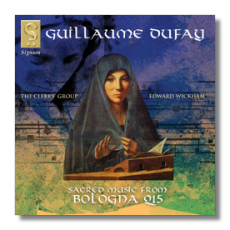
The Internet's Premier Classical Music Source
Related Links
- Latest Reviews
- More Reviews
-
By Composer
-
Collections
DVD & Blu-ray
Books
Concert Reviews
Articles/Interviews
Software
Audio
Search Amazon
Recommended Links
Site News
 CD Review
CD Review
Guillaume Dufay

Sacred Music from Bologna Q15
- Vasilissa, ergo gaude
- Kyrie, Fons bonitatis
- O beate Sebastiane
- Gloria
- O gemma, lux et speculum
- Credo
- Supremum est mortalibus bonum
- Sanctus and Benedictus
- Inclita stella maris
- Agnus Dei Gloria Spiritus et alme
- O sancte Sebastiane
Lucy Ballard, William Missin,
Chris Watson, Matthew Vine, Jonathan Arnold
The Clerks' Group/Edward Wickham
Signum SIGCD023 60:07
Guillaume Dufay (1397-1474) was a great French-Burgundian composer, perhaps my favourite of the "Flemish Polyphonists" whose influence in secular and ecclesiastical music spread throughout Europe. I came to love his music whilst my son was performing and recording some of it during the pioneering days of Musica Reservata in the '60s. This selection of sacred music from "Q15" (Civico Museo Bibliografico Musicale, MS Q15), compiled in Bologna over some 15 years, shows the variety of Dufay's invention.
The intricacy of Dufay's isorhythmic motets with multiple (simultaneous) texts beggars belief, and gives the lie to any notion that music has been 'progressive' through the centuries (q.v. Also Ockeghem in The Clerk's Group's recordings). Yet even more impressive than his contrapuntal genius is how Dufay balances predetermined structures (which may pass by ordinary listeners) with a flow of lyrical free-flowing tunes, often split between different voices, which make him a fabulous melodist, with a song-like gift which can be spoken of alongside Schubert's.
Edward Wickham is the perfect scholar-guide and his documentation is meticulous, comprehensive and a pleasure to read. The items use three to six voices, perfectly blended and recorded in an ideal ambience at St. Andrew's, West Wratting in the summer of 2000. All texts are provided, with English, French and German translations from the Latin.
For anyone whose collection does not have examples of the Flemish masters, this could be an ideal starting point.
For further exploration of this endlessly fascinating genre. I recommend the lavish book with CDs of Flemish Polyphony (Capella Sancti Michaelis/Currende Consort – Erik van Nevel) Eufoda 1160-69 and see also my review of OCKEGHEM - Recommended Recordings.
Copyright © 2003, Peter G. Woolf


















